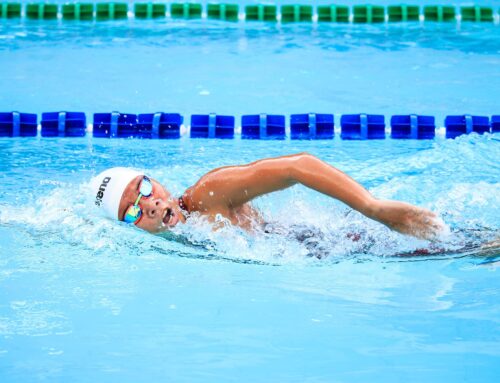Will swimming cure asthma?
There are no claims by professionals that swimming can cure asthma, whereas, many studies have done that shows that swimming is able to reduce the amount of asthma attacks and the severity of it.
Swimming is one of the best ways to control the symptoms of asthma and reduce the reliance on medication. Even though asthma can be caused by exercising, famous athletes with asthma such as Paula Radcliffe, Mark Spitz, and Amy Van Dyken have also overcame their conditions.
Speaking of Amy Van Dyken, she was an American swimmer who won 4 Gold medals during the 1996 Atlanta Olympic Games. Her gold medals were won in 50m freestyle, 100m butterfly, 4 x 100m freestyle and 4 x 100m medley events. Amy’s asthma has a limited lung capacity of 65%!
How does swimming help with asthma?
Children with asthma should be allowed to swim as it can improve lung capacity. Air near the surface of the water is usually warmer and more moist than normal air, therefore less likely to agitate the symptoms of asthma. When a child is able to pick up good breathing techniques, swimming can increase the volume of the lungs. Swimming is also an ideal low impact exercise that promotes general fitness and fun for children!
A scientific study published by Wiley-Blackwell in Respirology revealed that swimming helps reduce the symptoms of asthma in children. Improvements in symptoms have been observed in by asthmatic children who underwent a 6-week swimming programme, which included a reduction in asthma severity, mouth-breathing, snoring and chest deformity. Self-confidence was also boosted!
The lead author at Taipei Medical Univerity, Wang Jeng-Shing, reported that the children continued to enjoy the improvements in their health even a year after the swimming program.
“Unlike other sports, swimming is unlikely to provoke asthma attacks… swimming promotes normal physical and psychological development, such as increasing lung volume, developing good breathing techniques and improving general fitness.”
Some parents may be concerned about chlorine in the water. This is generally safe as long as the child does not spend long hours in the pool. Some children may find that their asthma symptoms are triggered in the pool, thus parents should practice discretion. If the child feels uncomfortable with the strong smell of chlorine, it is advisable not to step into the pool until the child feels better.
Swimming to reduce asthma
The Department of Pedatrics, University of Maryland School of Medicine, Baltimore, found that asthmatic children who where involved in a two-month, consistent program of swim training, showed “significant improvement in all clinical variables”, including “symptoms, hospitalisations, emergency room visits and the school absenteeism compared with their previous medical history or to those of age-matched controls. In addition, these benefits were more visible even up to a full year after the program was discontinued.
Asthma – Swimming the best exercise?
If you take different kinds of exercise so that you use the same amount of oxygen in each one, some will cause more wheeziness or chest tightness than others. Running outdoors will in general be worse than swimming. In fact swimming is one of the best forms of exercise for people with asthma because it usually causes the least amount of chest tightness. Running indoors on a treadmill, or cycling on an indoor exercise bike will come somewhere between outdoor running and swimming.
Other factors influence the amount of worsening of your breathing which you get from a particular form of exercise. Generally for example, if the air you breathe is cold and dry, the asthma will be worse. If it is warm and moist, the asthma will be less bad. This explains why swimming generally causes less asthma than outdoor running.
Myth – Swimming causes asthma
There had been many reports that states swimming can cause asthma due to the use of chlorine to treat the water. This might be true in poorly maintained swimming pools, but swimming pools in Singapore meets a certain criteria in order to operate. In many countries, strong chlorine gas may with a pH level not even fit for usual swimmers without asthma, which has been put into the study.
In Singapore Swimming Academy, we have set up a research team to evaluate the number of students having who has asthma, and the amount times asthma is being triggered in the course of swimming and when they are not swimming. Up till now, the number of asthma being triggered in the course of swimming is 0%.
Seek Professional Advice
Parents should always get a green light from the child’s doctor before arranging for swimming lessons, especially if the symptoms of asthma are more pronounced during and after exercising. A doctor may consider prescribing medication to prevent the symptoms of exercise-induced asthma from surfacing. Heeding the doctor’s advice is absolutely necessary!













